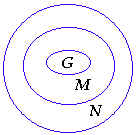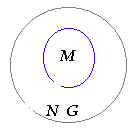| I. Confucianism is basically a humanistic social
philosophy. What this means can best be seen by contrasting humanism with naturalism
and supernaturalism. |
|
A. Naturalism: the philosophical belief that what is
studied by the social and physical sciences is all that exists (and the need for any
explanation going beyond the universe is denied). |
|
|
1. The understanding of the universe requires no supernatural
cause. The natural world is the whole of reality. |
|
|
|
a. The universe is self-existent, self-explanatory, and self-operating. b.
The world process is purposeless, deterministic, and only incidentally productive of man.
I.e., There is no purpose. What is there that could give purpose to things?
c. Human life (physical, mental, moral, and spiritual) is an ordinary event
--attributable in all respects to the ordinary operations of nature. |
 Naturalism
Symbol Legend:
G = God
M = Man
N = Nature |
|
|
2. Stratonician presumption (Strato of Lampsacus): the
claim that it is up to anyone wanting to postulate a God to show sufficient reason for
doing so. 3. Why cannot the Universe's existence and fundamental characteristics be
themselves the ultimate features of explanation?
4. Consequential Spiritual Ideals: Hence, discovering how human beings should
act is a matter of discovering how nature acts, so man's actions can be in accord with
nature. |
|
|
|
a. Trust instincts: by acting in accord with nature,
what seems superhuman feats become possible. b. By being in tune with nature, we become
far more aware of the realm of possibilities.
c. We don't fight nature, we don't wish things were different, we don't force events to
happen. (Instead of carrying the boat, the boat carries you.)
d. We become at one with the world--e.g., Zen and Taoism. |
|
B. Supernaturalism: the theological belief that
a force or power other than man or nature is ultimate. |
|
|
1. This supernatural force (God) regulates both man
and nature, making both of them subordinate to it. (God as creator.) 2. Man is
considered to be higher than the rest of nature.
3. Consequent Spiritual Ideals: |
 Supernaturalism
Symbol Legend:
G = God
M = Man
N = Nature |
|
|
|
a. How human beings should act is largely a matter of knowing
and doing God's will. b. Hence, human beings must transcend themselves and not
trust their instincts. |
|
C. Humanism: the philosophical belief that the welfare
and happiness of mankind in this life is of primary concern. |
|
|
(In this century, the label has been used for naturalistic
humanists who reject all religious beliefs, insisting that we should be exclusively
concerned with human welfare in this, the only world.) 1. Hence, people,
rather than God or nature are taken as ultimate.
2. There is nothing superior to man as a source of human principles.
3. Consequent Spiritual Ideals: The answer to the question, "How can
goodness and happiness be achieved?" is gotten by pointing to the principles of
action found within man himself--humaneness. |
 Humanism
Symbol Legend:
G = God
M = Man
N = Nature |
|
|
|
a. In Confucianism jen (wren) means that the humaneness
of a person is the source of these principles. b. Consequently, the first principle of
Confucianism is to act according to jen. |




